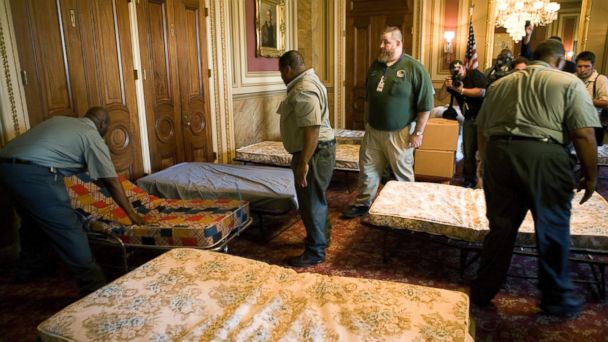7 Capitol Hill All-Night 'Slumber Parties' of the Past Decade

(Joshua Roberts/Getty Images)
Environmental enthusiasts, grab a pillow, pop some popcorn and flip on C-SPAN. Tonight, 28 senators - 26 Democrats and two Independents - will pull an old-fashioned all-nighter on Capitol Hill, all in the name of bringing attention to the issue of climate change.
Led by Sens. Brian Schatz, D-Hawaii, Barbara Boxer, D-Calif., and Sen. Sheldon Whitehouse, D-R.I., the "Senate Climate Action Task Force," as they call themselves, will spend the night urging Congress to help curb global warming.
It's hardly the first Senate sleepover on record, nor is it likely to be the last.
The art of the all-night political talk-a-thon dates back to February 1915, when a deadlocked Senate spent 54 hours wrangling over the Ship Purchase Act. Since then, the Senate has stayed open past 4 a.m. more than 30 times, according to the Senate Historical Office.
Each senator will likely speak tonight for a little more than 30 minutes, a far cry from the time in 1957 when Sen. Strom Thurmond, R-S.C., railed against civil rights nonstop for more than 24 hours before the Senate passed the bill he had opposed.
And if you think tonight's appeal is likely to be impassioned, consider Sen. William "Wild Bill" Langer, R-N.D., who in 1950 spoke until he collapsed on the Senate floor, abruptly ending his uninterrupted five-hour crusade against the Communist Registration Bill. The 63-year-old was reportedly carried, gasping, from the Senate building.
Here's a look at seven Capitol Hill all-nighters of the past decade:
1. November 2003:
Republican senators staged an all-night "reverse filibuster" called "Justice for Judges" to protest Democratic filibusters of four George W. Bush judicial nominees. Though the Senate remained in session for more than 53 hours (with one hour-and-a-half long recess), GOP senators were ultimately unable to overcome the filibusters and several nominees withdrew their names from consideration.
2. December 2006:
Senators remained in session for 19 hours to consider a Tax and Trade package, which eventually passed 79-9, and a continuing resolution, which funded the government for six months.
3. July 2007:
A single Senate session dragged on for more than 31 hours as Democrats pushed for a simple up-or-down vote on a plan to withdraw troops from Iraq. Sen. Harry Reid, the Senate Majority Leader from Nevada, had planned a series of all-night quorum calls but briefly suspended them from midnight to 5 a.m. out of concern for older members. Ultimately, Senate Dems were unable to force a vote.
4. September 2012:
The Senate lingered in session until 4:03 a.m., delayed by squabbling over procedural issues. After hours of wrangling, the chamber was finally able to vote on - and ultimately pass - a stopgap spending resolution that funded the government for another six months. In return for the budget vote, senators agreed to vote on a bill proposed by Sen. Rand Paul that would have cut off foreign aid to Egypt, Libya, and Pakistan. Paul's bill was soundly defeated, 10-81. Before heading home, senators also voted to take up Sen. John Tester's sportsman's bill, which relaxed regulations for hunters and fisherman, when Congress resumed following the November elections.
5. March 2013:
After 13 hours of floor debate, the Democrat-controlled Senate narrowly passed a budget for the first time in four years. The non-binding $3.7 trillion budget, which called for $1 trillion in new taxes over 10 years, was adopted just before 5 a.m. The senate had been in session for 20 hours.
6. September 2013:
The Senate spent 34 hours debating a Continuing Appropriations Resolution that included funding for the Affordable Care Act. During that time, tea party conservative Sen. Ted Cruz, R-Texas, spoke for a whopping 21 hours, urging Congress to defund Obamacare. But his talk-a-thon was symbolic, not procedural: it delayed, but could not prevent, a procedural vote. And in the end, Cruz voted to consider the very bill he was protesting. Ultimately, time ran out and the government shut down for 16 days.
7. December 2013:
The Senate stayed up for 48 straight hours to confirm some of the president's nominees, a piece of nuclear-option fallout as Republicans insisted on using the clock in retaliation. They confirmed Cornelia Pillard as a D.C. Circuit Court judge just after 1 a.m. and then began the nomination process for Equal Employment Opportunity Commission hopeful Chai Rachel Feldblum.